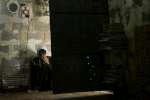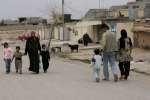After Paris attacks, refugees should not be turned into scapegoats
News Stories, 17 November 2015
GENEVA, Nov 17 (UNHCR) – The UN refugee agency has expressed its shock and horror at the attacks in Paris and the killing of so many innocent people, and cautioned against the scapegoating of refugees.
UN High Commissioner for Refugees António Guterres has conveyed his solidarity with the government and people of France as he also did with the government of Lebanon following the recent deadly attacks in Beirut.
"UNHCR is deeply concerned by the yet unconfirmed news that one of the attackers in Paris might have entered Europe as part of the current influx," UNHCR spokesperson Melissa Fleming told a press briefing in Geneva.
"We strongly believe in the importance of preserving the integrity of the asylum system. Asylum and terrorism are not compatible with each other. The 1951 Refugee Convention is clear about that and in fact excludes from its scope people who have committed serious crimes," she added.
Fleming stressed that the overwhelming majority of those coming to Europe are fleeing persecution or the life-threatening effects of conflict and are unable to reach safety in Europe by alternative avenues. Precarious situations in countries of first asylum are also driving many to leave for Europe.
"Many are fleeing extremism and terrorism – from the very people associated with the Paris attacks," she said. "A world that welcomes Syrians can help defeat extremism. But a world that rejects Syrians, and especially Muslim refugees, will just feed into their propaganda."
The refugee agency is also concerned about reactions by some States in the aftermath of the attacks. These include ending programs being put in place to aid refugees, backtracking from commitments made to manage the refugee crisis through relocation, or proposing the erection of more barriers.
"We are deeply disturbed by language that demonizes refugees as a group. This is dangerous as it will contribute to xenophobia and fear. The security problems Europe faces are highly complex. Refugees should not be turned into scapegoats and must not become the secondary victims of these most tragic events," Fleming said.
"It also points to the urgent need to significantly expand legal avenues, notably resettlement and humanitarian admission programs, as alternatives to the dangerous and irregular journeys while cracking down on smugglers."
From the beginning, UNHCR has been urging States to put in place immediately an effective reception, registration and screening mechanism immediately upon arrival. For those determined to be refugees, protection should be provided and eligible asylum-seekers should be relocated under the EU plan.
Relocation and other agreed measures can improve the management and stabilisation of current flows of people. These measures include security measures and the proper registration of all those on the move.


































